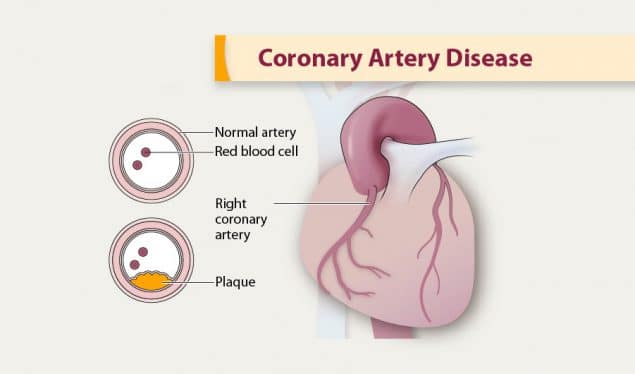Heart disease is the leading cause of death for men and women in the United States. Heart disease encompasses a range of conditions that affect the structure or function of your heart and different factors can increase your risk of heart disease. One of the most common causes of heart disease is coronary artery disease which is plaque buildup in the walls of the arteries. Plaque is made of cholesterol, inflammatory cells, calcium, and other substances that travel through your bloodstream. The plaque makes the inner walls of your vessels sticky and the more that builds up, the more narrow your blood vessels become. This narrowing can block blood flow to your heart muscle and the rest of your body.
Other types of heart disease include:
| Heart rhythm problems (arrhythmias) | Heart infection |
| Heart defects you’re born with (congenital heart defects) | Disease of the heart muscle |

Reducing the Risks for Coronary Artery Disease
Unhealthy lifestyle habits such as being overweight, lack of exercise, eating a diet high in fat, sugar, and cholesterol, and smoking are all risk factors for CAD. Other health conditions that may increase your risk for CAD are diabetes, high blood pressure, and high cholesterol levels. A family history of heart disease and can also increase your risk for CAD, especially if a parent developed it at an early age (50 or younger).
Heart disease is easier to treat when detected early, so it is important to talk to your Med First provider about any concerns, new signs, symptoms, or family history regarding your heart that can put you at higher risk. Your Med First provider can also help you make changes to lifestyle habits that are putting you at risk. While there are some things you can’t control like family history or underlying health issues, there are many things you can do to reduce the risks of getting heart disease.
Do your part to prevent heart disease:
- Eat a healthy diet: Eat plenty of unprocessed foods high in fiber such as grains, vegetables, and fruits. Try to limit foods with high saturated fats, sodium, or sugar, which increase cholesterol, blood pressure, and triglycerides which lead to a higher risk of heart disease.
- Keep your cholesterol and triglycerides under control: As mentioned, cholesterol and triglycerides are high-risk factors in heart disease. High levels of cholesterol can clog your arteries and raise your risk of coronary artery disease. Triglycerides, another fat in the body, can cause hardening of the arteries, increasing the risk of a stroke or heart disease.
- Control your blood pressure: High Blood pressure is a major risk for heart disease. Adults need to get their blood pressure checked a minimum of once a year and make sure to keep it stable.
- Control Diabetes: Make sure you keep your blood sugar under control. Heart disease is the number one cause of death among people with type 2 diabetes
- Keep a healthy weight: Being overweight or obese increases your risk of heart disease. Obesity increases your risk of hypertension, high cholesterol, and diabetes, all of which are linked to heart disease.
- Stay active: Try to get regular exercise. Exercise improves your blood circulation and strengthens your heart. It is also great for lowering cholesterol and keeping a healthy weight. Shoot for exercising 30 minutes a day.
You can do your part to prevent heart disease with lifestyle changes, such as eating healthy, exercising, losing weight, reducing alcohol, and quitting smoking.
If you are concerned about your cholesterol, triglycerides, blood pressure, or any other factor linked to heart disease such as diabetes, visit one of Med First’s clinics for a checkup and tests. You don’t even have to leave the Med First office in order to start your journey to better heart health. At Med First, we are able to obtain EKGs, Chest X-Ray, and take blood samples onsite. We can also order specialized imaging or refer you to a specialist if needed. Self-schedule your appointment any time it is convenient for you through our secure patient portal or call our appointment team to book your exam with one of our highly skilled healthcare teams, today!
References:
https://www.cdc.gov/heartdisease/coronary_ad.htm
https://www.webmd.com/heart-disease/guide/heart-disease-coronary-artery-disease
https://www.mayoclinic.org/diseases-conditions/heart-disease/diagnosis-treatment/drc-20353124
https://www.cdc.gov/diabetes/library/features/diabetes-and-heart.html
